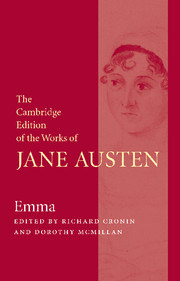Chapter 12
Published online by Cambridge University Press: 18 December 2020
Summary
MR. KNIGHTLEY was to dine with them—rather against the inclination of Mr. Woodhouse, who did not like that any one should share with him in Isabella's first day. Emma's sense of right however had decided it; and besides the consideration of what was due to each brother, she had particular pleasure, from the circumstance of the late disagreement between Mr. Knightley and herself, in procuring him the proper invitation.
She hoped they might now become friends again. She thought it was time to make up. Making-up indeed would not do. She certainly had not been in the wrong, and he would never own that he had. Concession must be out of the question; but it was time to appear to forget that they had ever quarrelled; and she hoped it might rather assist the restoration of friendship, that when he came into the room she had one of the children with her—the youngest, a nice little girl about eight months old, who was now making her first visit to Hartfield, and very happy to be danced about in her aunt's arms. It did assist; for though he began with grave looks and short questions, he was soon led on to talk of them all in the usual way, and to take the child out of her arms with all the unceremoniousness of perfect amity. Emma felt they were friends again; and the conviction giving her at first great satisfaction, and then a little sauciness, she could not help saying, as he was admiring the baby,
“What a comfort it is, that we think alike about our nephews and nieces. As to men and women, our opinions are sometimes very different; but with regard to these children, I observe we never disagree.”
“If you were as much guided by nature in your estimate of men and women, and as little under the power of fancy and whim in your dealings with them, as you are where these children are concerned, we might always think alike.”
- Type
- Chapter
- Information
- Emma , pp. 105 - 115Publisher: Cambridge University PressPrint publication year: 2005

